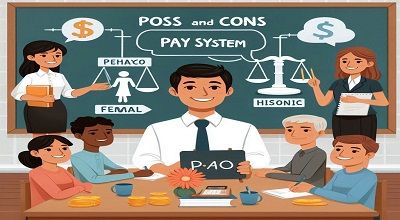Merit-Based Pay System
Implementing a merit-based pay system for teachers, where educators are compensated based on their performance, has both advantages and disadvantages. Here’s a breakdown:
Pros:
- Motivation for Excellence: Merit-based pay can incentivize teachers to strive for excellence in their teaching methods and outcomes. Teachers may be more motivated to improve their skills, innovate in the classroom, and invest more effort in their students’ success. If they know their compensation is tied to their performance.
- Recognition of Effort: Outstanding teachers who consistently go above and beyond in their duties can be appropriately rewarded for their hard work and dedication. This recognition can foster a positive work environment and morale among teachers.
- Attracting Talent: A merit-based pay system can attract high-quality teachers to the profession by offering the potential for higher earnings based on performance. This can help schools recruit and retain talented educators, ultimately benefiting students with access to better teaching.
- Alignment with Performance: Linking pay to performance can create a more direct alignment between teacher effectiveness and compensation. This can help ensure that resources are allocated efficiently and that students receive high-quality instruction.
- Fairness and Equity: Merit-based pay systems can be designed to reward teachers based on objective criteria. Such as student academic growth, classroom observations, and contributions to school improvement initiatives. This can help ensure fairness and equity in compensation decisions.
Cons:
- Subjectivity in Evaluation: Evaluating teacher performance can be subjective and open to bias. Leading to concerns about fairness and accuracy in determining merit-based pay. Factors such as student demographics, class size, and administrative support can influence student outcomes, making it challenging to isolate the impact of individual teachers.
- Narrow Focus on Test Scores: Merit-based pay systems may lead to a narrow focus on standardized test scores as the primary measure of teacher effectiveness. This can encourage teaching to the test and neglect other important aspects of education, such as critical thinking skills, creativity, and socio-emotional development.
- Competition and Collaboration: Merit-based pay systems may create a competitive rather than collaborative culture among teachers, as educators may prioritize individual performance over collaboration and teamwork. This can hinder professional development and the sharing of best practices within schools.
- Risk of Burnout: The pressure to meet performance targets and earn merit-based pay can contribute to increased stress and burnout among teachers. Constantly striving to meet performance metrics without adequate support or resources can negatively impact teacher well-being and job satisfaction.
- Attrition and Turnover: Merit-based pay systems may lead to increased attrition and turnover among teachers. Particularly those who feel unfairly evaluated or undervalued. This can disrupt continuity in education and negatively impact student achievement.
Conclusion
In conclusion, merit-based pay for teachers has the potential to incentivize excellence and attract talent. It also poses challenges related to fairness, subjectivity, and unintended consequences. Effective implementation requires careful consideration of evaluation criteria and support structures. The broader educational context to ensure that such systems benefit both teachers and students.
